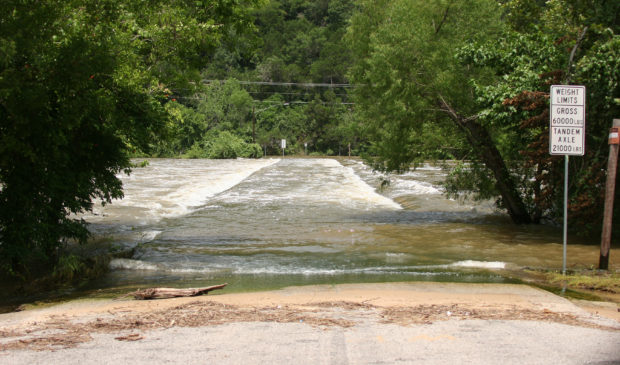Newsletter Signup
The Austin Monitor thanks its sponsors. Become one.
Most Popular Stories
- Council members celebrate unanimous defeat of bill that proposed putting Austin under state control
- A once-banned type of building is back in favor – and the Planning Commission approves
- City facing a $33 million deficit for 2026
- SOS suing state agency over failure to provide information on MoPac expansion
- Austin churches answer prayers for affordable housing – by building it themselves
-
Discover News By District

Joint Sustainability Committee looks at trends during flooding and extreme heat
Friday, May 28, 2021 by Seth Smalley
On Wednesday, researchers Patrick Bixler, Diana Joyce Ojeda and Jessica Jones presented an update on sustainability indicators – particularly the effects of flooding and extreme heat in the Austin area – to the Joint Sustainability Committee.
The research focuses on the differences in how people experience extremes of weather depending on their ethnicity, their income bracket and their geographic locations within Central Texas.
“The mission of the Austin area sustainability project is to measure the quality of life and sustainability trends” in the region, said Jones, a dual degree grad student at the UT School of Architecture and the LBJ School of Public Affairs. “We hope to serve as a foundation for a systems approach to address the challenges of our region.”
The data came from a biennial survey taken in six Central Texas counties: Travis, Burnet, Hays, Caldwell, Bastrop and Williamson.
Respondents from the city of Austin, unsurprisingly, reported experiencing extreme heat events at greater rates than flooding events. Thirty-one percent of Austin respondents had experienced flooding, while 68 percent reported experiencing extreme heat.
The survey has been in circulation since 2004.
Jones told the committee that sharing the findings of the research should help philanthropy, NGOs, government and community entities “use these data to improve decision-making processes.”
The most recent survey, which was primarily done over the phone, took place between September and December 2020.
Some of the responses, Jones said, also came from the internet. The majority of responses came from Travis County; in particular, the 78744 and 78753 ZIP codes.
Those in the 78744 area – Dove Springs – reported at higher rates than others in the survey that floods were increasing in their area. White respondents indicated at higher rates that they had access to transportation during flooding events.
“We see that, over the past 10 years, that Hispanic respondents indicated at higher rates that they were without transportation during a flood event,” said Ojeda, Jones’ colleague.
Interestingly, those in the $75,000 to $100,000 income bracket reported higher rates of being without electricity during Austin flooding events. Hispanic respondents reported signing up for emergency alerts, as well as energy assistance programs, at higher rates in the city of Austin as a whole.
The vast majority of respondents did not ask for help from disaster organizations such as FEMA, the Red Cross or the Salvation Army.
“Additionally we saw that most of the survey respondents, or 16.7 percent, tended to reach out to food pantries during hazard events,” Ojeda told the committee.
Eighty percent of survey respondents reported satisfaction with the performance of the Texas Division of Emergency Management, while only 50 percent were satisfied with the performance of FEMA. Over 70 percent were satisfied with the performance of food pantries.
Photo by Bob McMillan, public domain, via Wikimedia Commons.
The Austin Monitor’s work is made possible by donations from the community. Though our reporting covers donors from time to time, we are careful to keep business and editorial efforts separate while maintaining transparency. A complete list of donors is available here, and our code of ethics is explained here.
You're a community leader
And we’re honored you look to us for serious, in-depth news. You know a strong community needs local and dedicated watchdog reporting. We’re here for you and that won’t change. Now will you take the powerful next step and support our nonprofit news organization?





